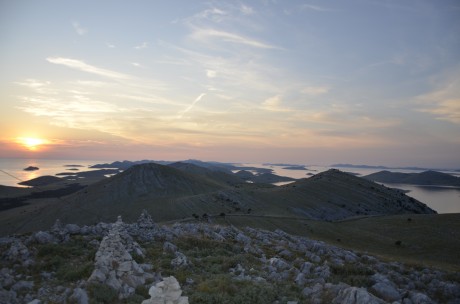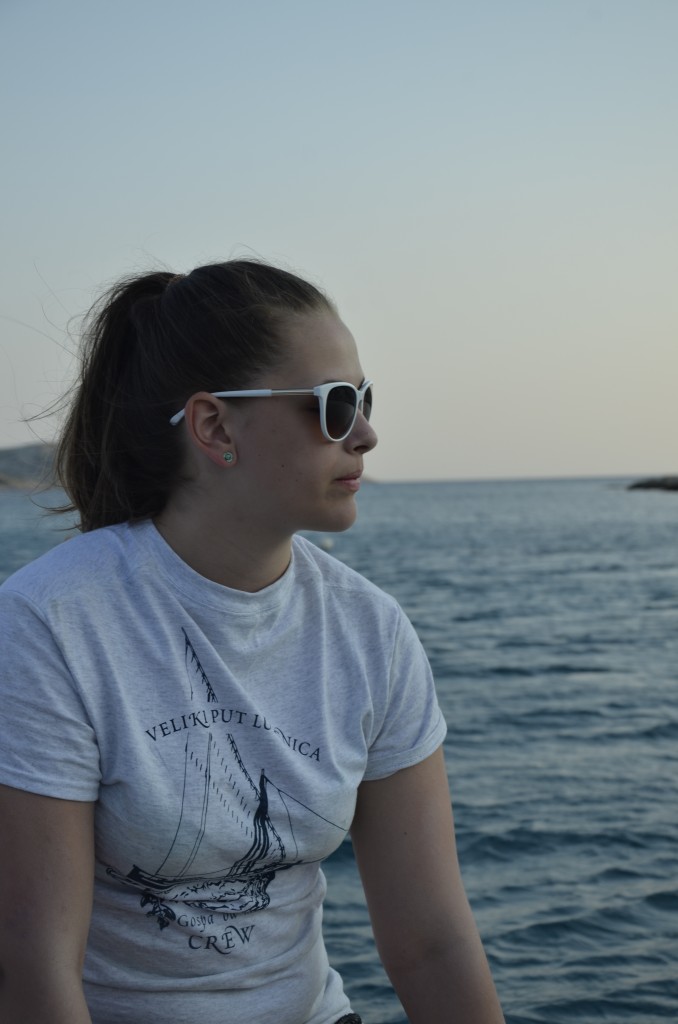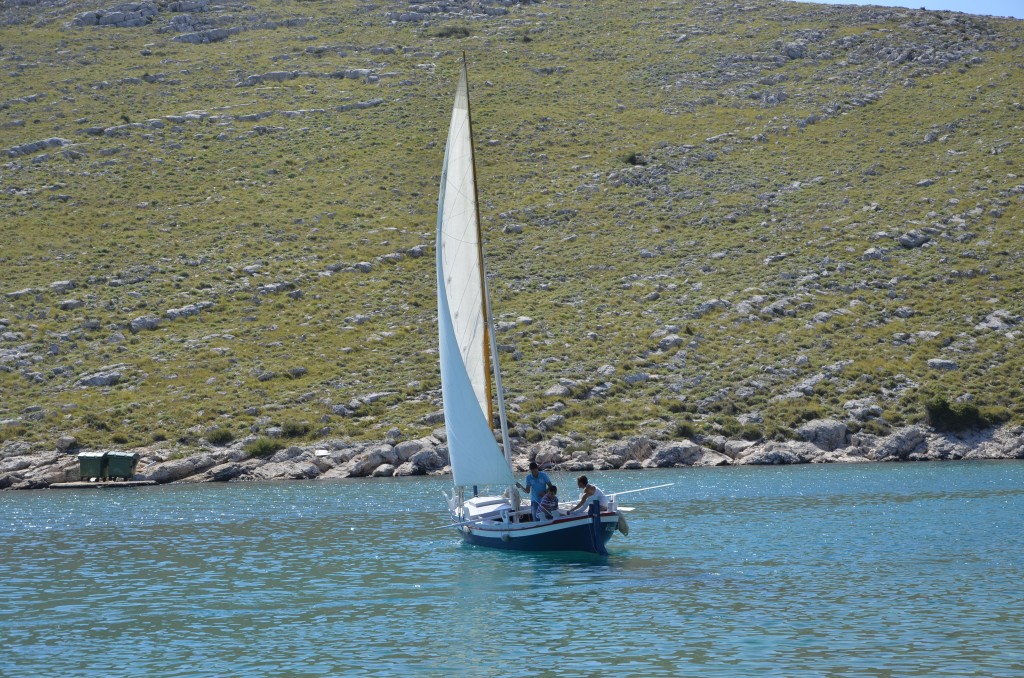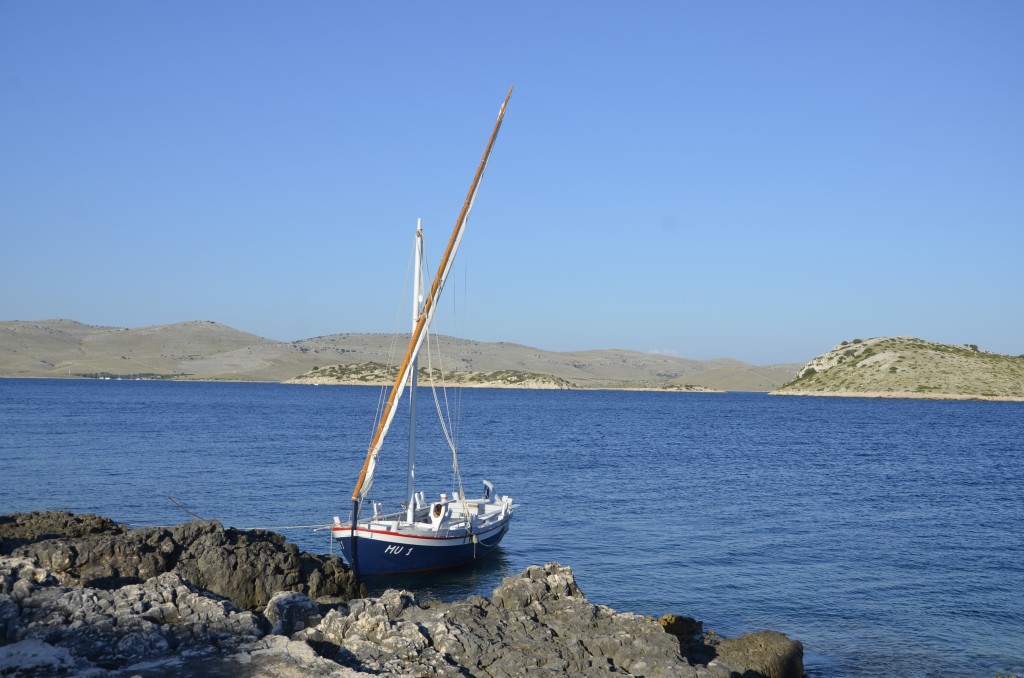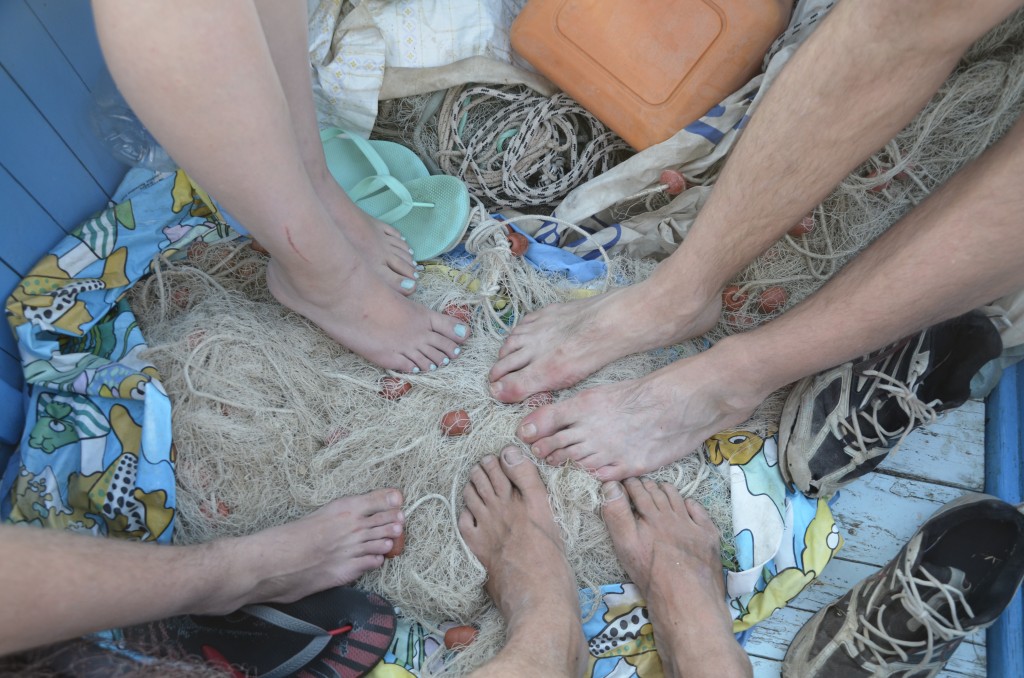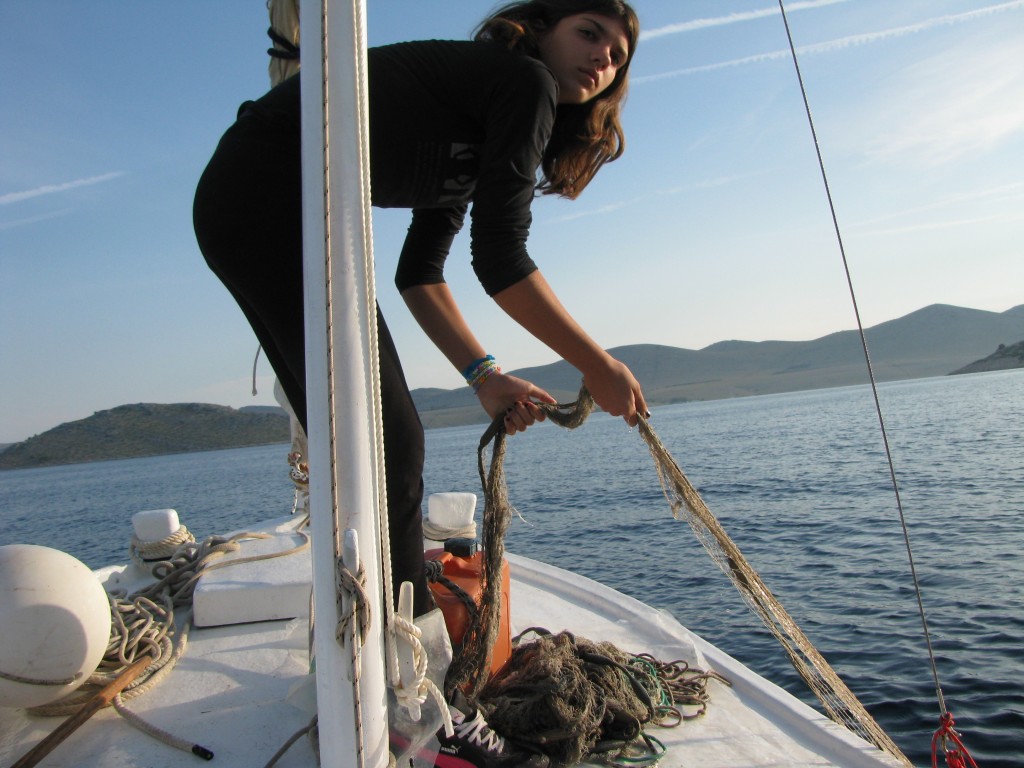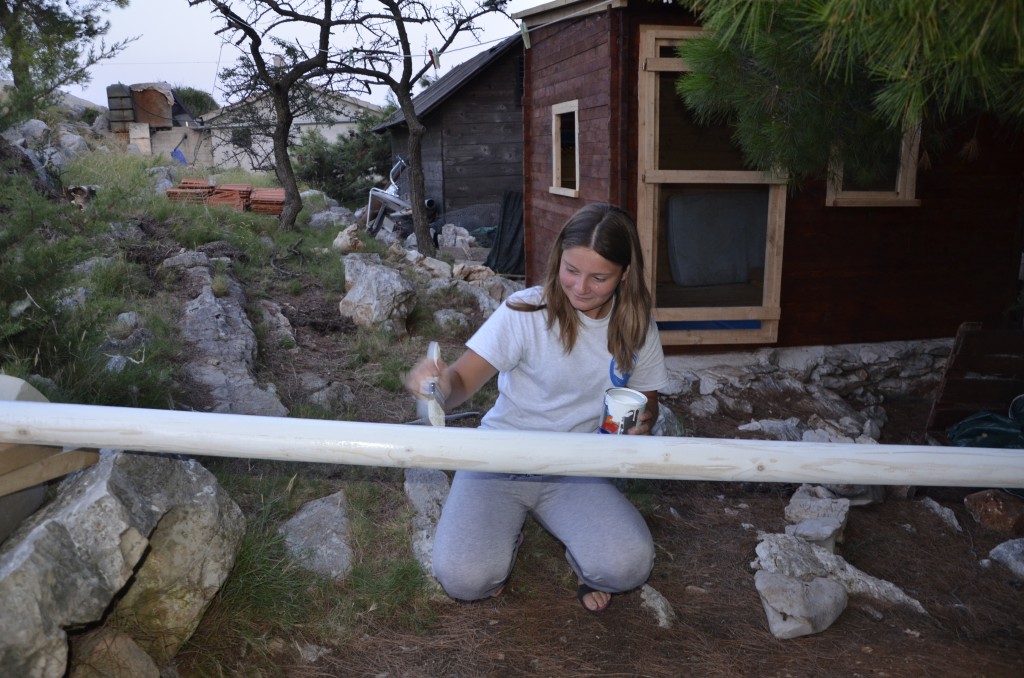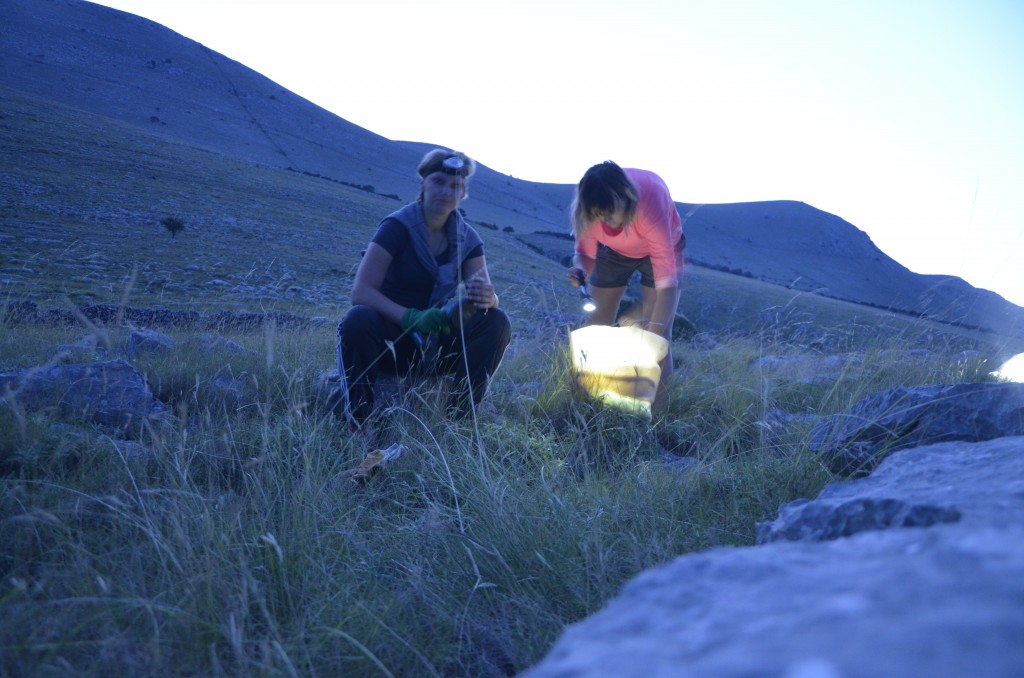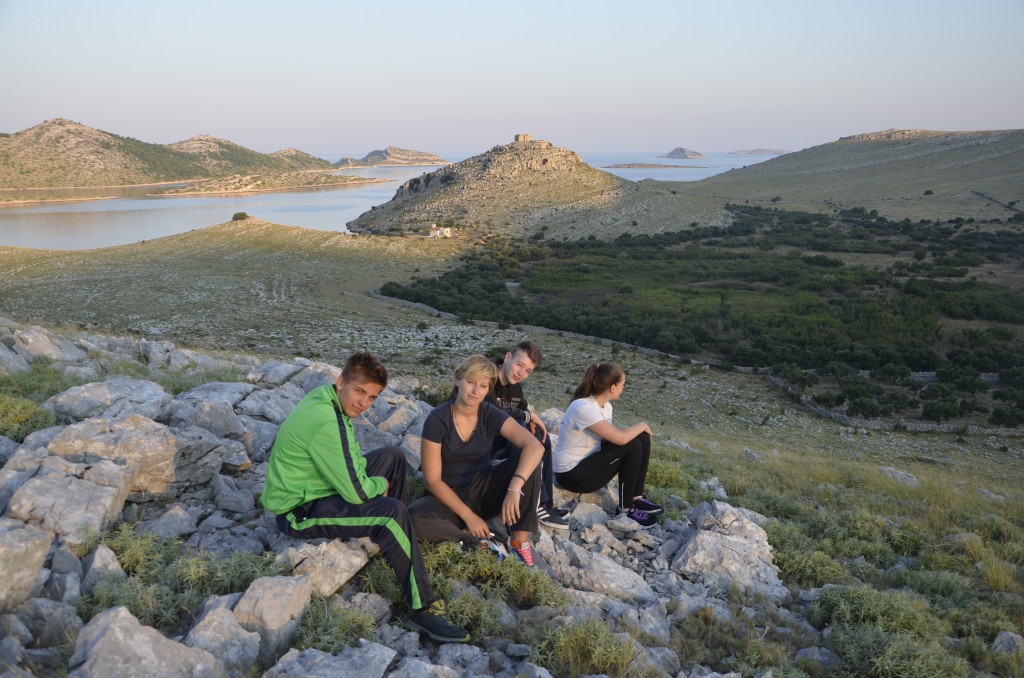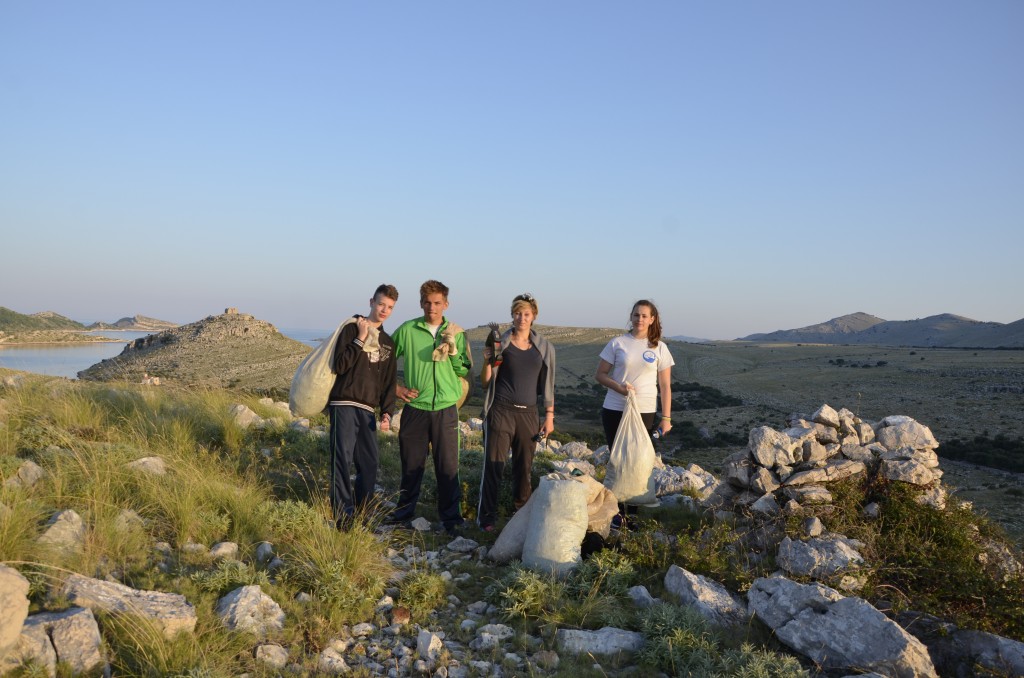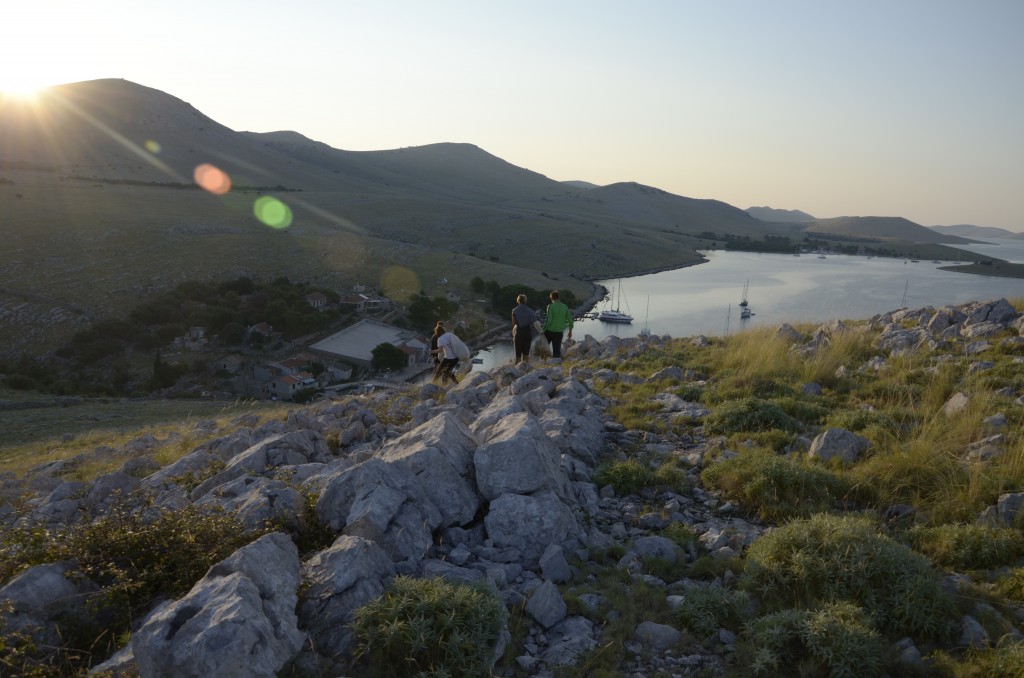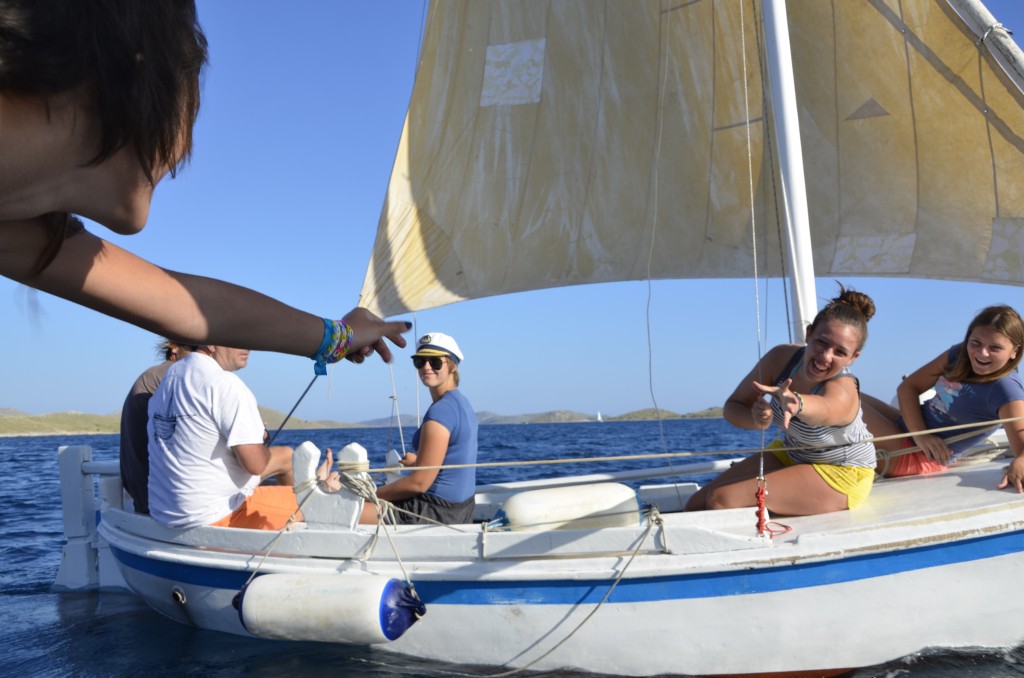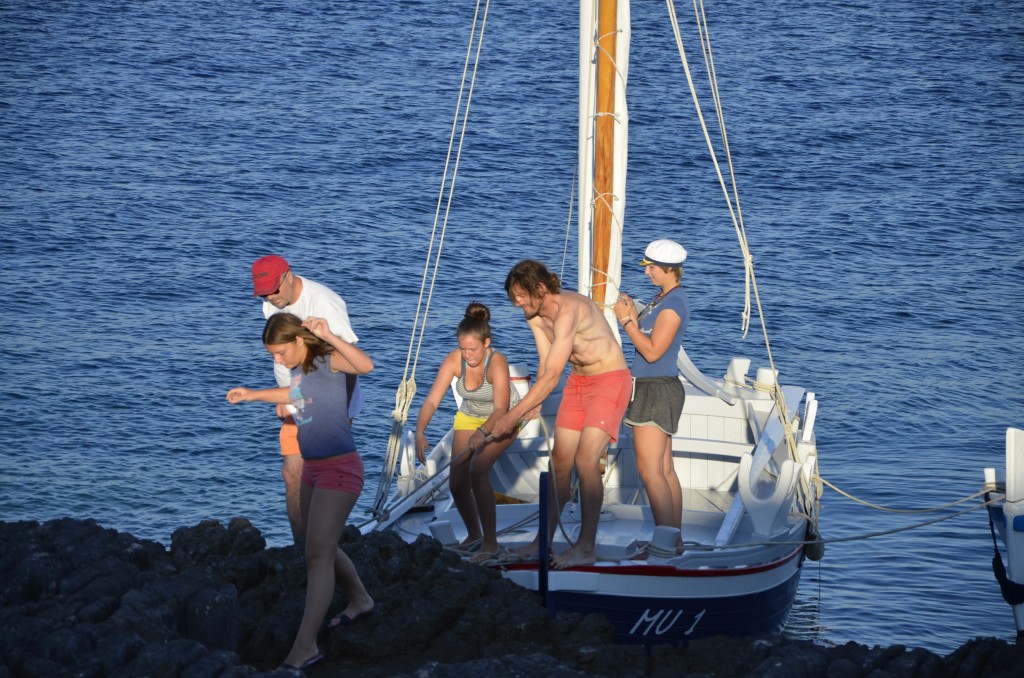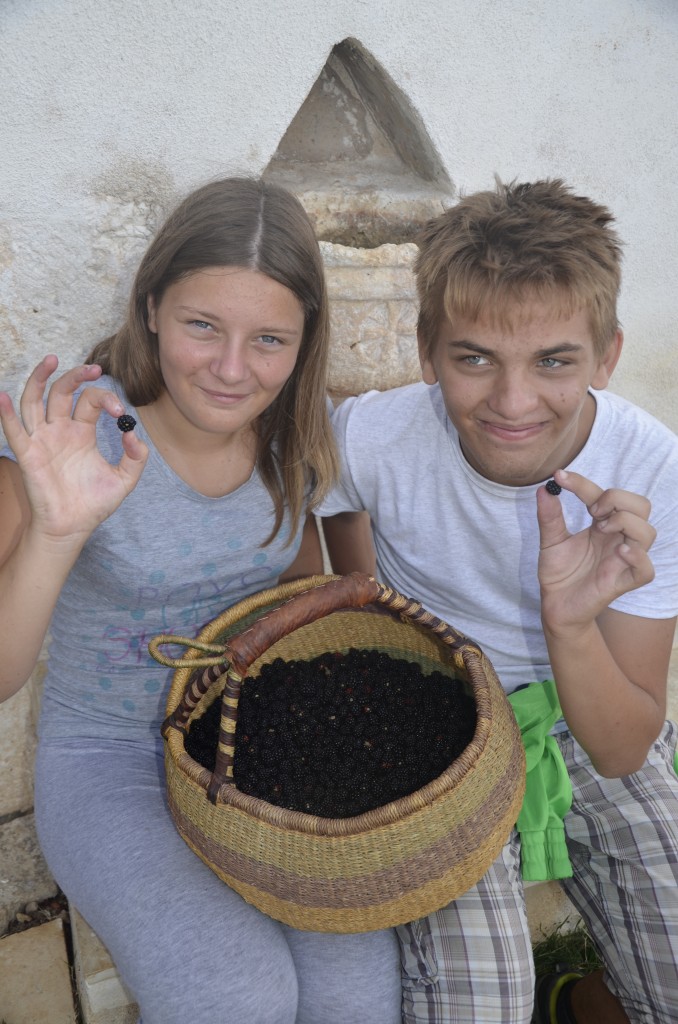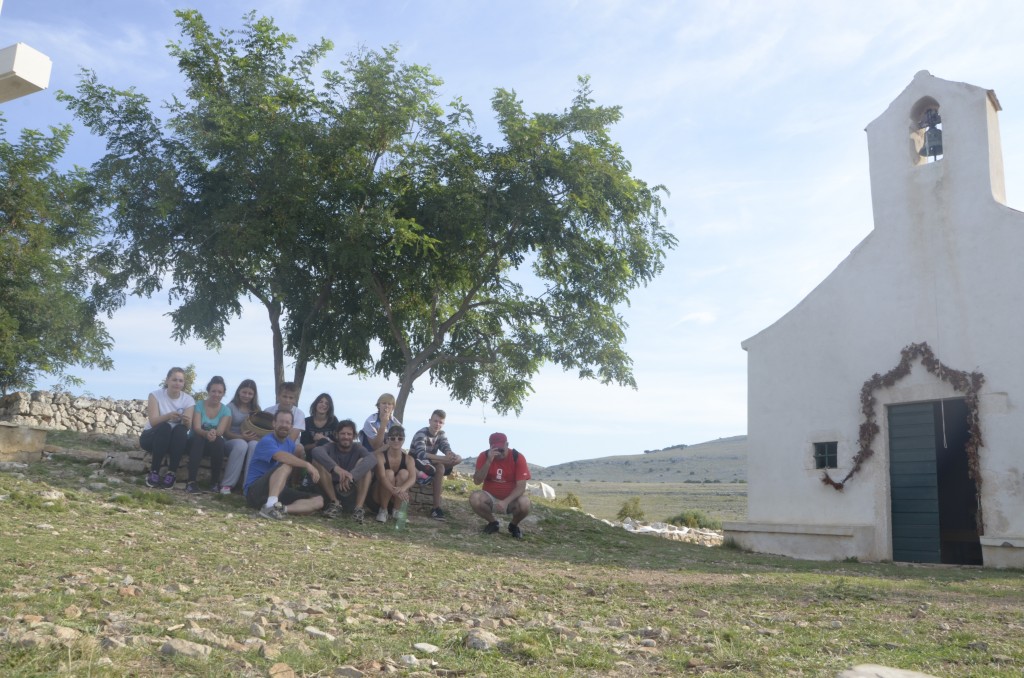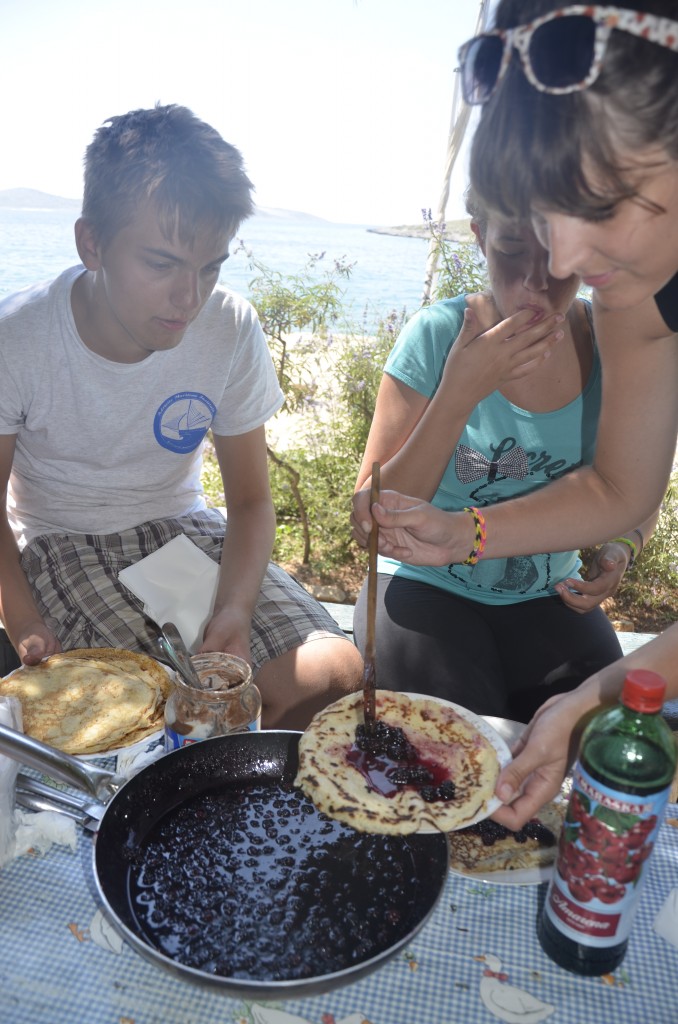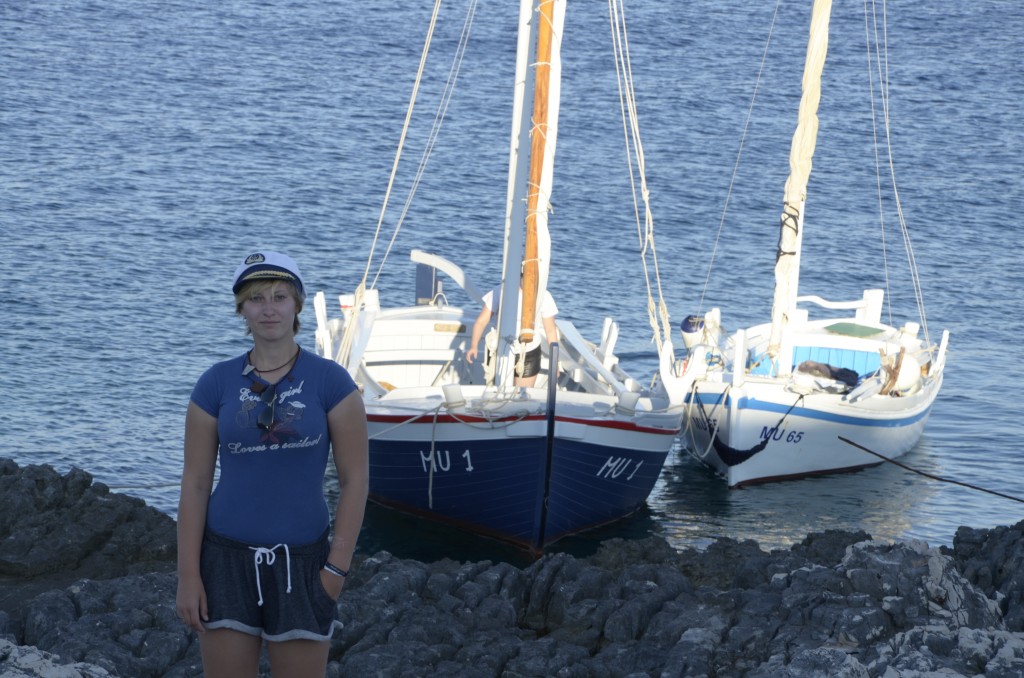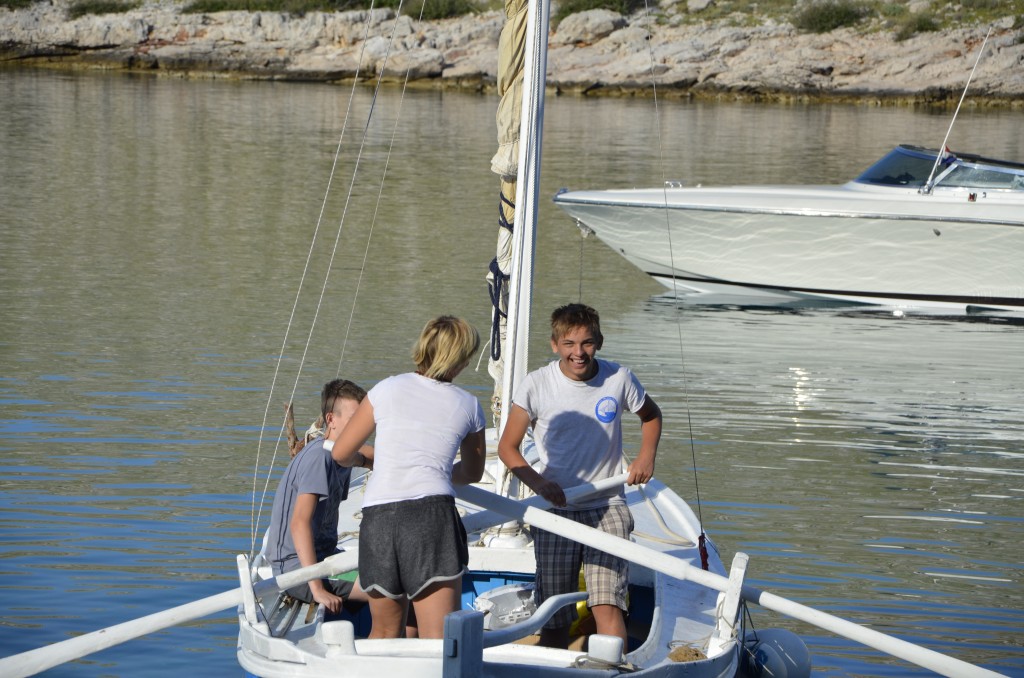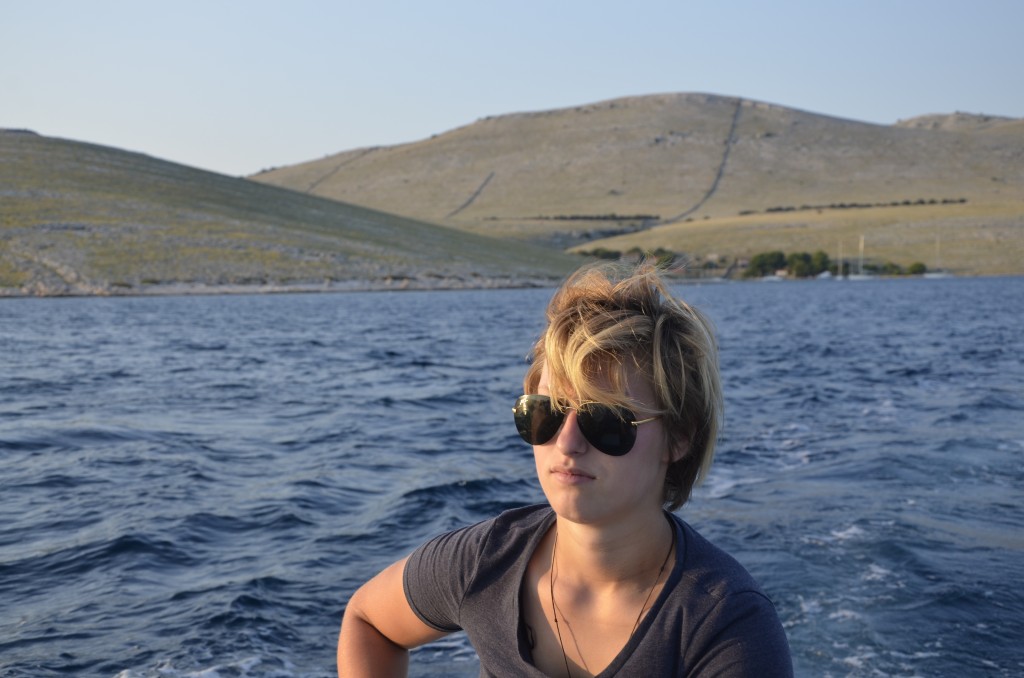There is a special feeling getting underway on a boat with no engine. One that is difficult to describe. It is like mix between helplessness and being ultra prepared at the same time. In your mind you run each scenario as you scan the horizon looking for tells of wind, crossing vessels, thinking to yourself, “If I am there what would I do.” Each situation only takes a second to evaluate and as we left Murter, as the boat left the dock, each occurrence played subliminally in my head. I also felt the responsibility of an entire island on my shoulders. I knew people were rooting for us and we had to be safe and successful if I ever wanted to sail Kurnatarica, this beautiful 6.5 meter Betiniska Gajeta, ever again.
We were getting underway for the Kornati islands with group of students from the Children’s Home Maestral and Udruga MoSt from Split. Our team had the opportunity to visit the village of Kravljačica and work and live with the Skračić family to help with the collection sage to make into essential oils and teas. We also would be learning about about the lore of the sea and the ways of the fishermen from the islands, including how to sail a motorless gajeta as our main method of transportation.
The Kornati islands are rugged. The ground is mostly rock with little soil, an impossible place to walk barefoot, as the jagged points protrude from uneven surface making it precarious for even the sure footed sheep that climb the hills. Until recently, the people who live on these islands have made a living from agriculture. This has been a particular difficult task. Each activity whether it be gardening, tending sheep, or the collecting herbs in this craggy landscape comes with a certain set of challenges. The Kurnatari, who inhabit these remote islands have found ways to make a living by combining maritime life with terrestrial cultivation.
Lovro Skračić who’s family has lived in the islands for generations, said just before leaving “ I hope they like it.” with a sort of compassionate tone. I replied, “don’t worry, they wont, they are teenagers. At first they will hate it and complain. It is only later that they will really appreciate how special this trip will be.” The students, who were aged 14-18, had been on trips with us before, including the Watermelon Voyage and sailing in the bay in Kaštela. We also had a local partner organization from Murter, Latinsko ‘idro.
Latinsko ‘idro was a key partner because they where the ones who allowed us to use the beautiful Gajeta Kurnatarica, which was built buy Ante Frožop. This boat was a keystone for us, bringing together maritime heritage and youth development. It was painstakingly researched by the builders and several others scholars to create a historically accurate vessel of its era. It is traditional in its entire element, a Betinska Gajeta in its truest form.
This type of boat has been very important for the people of Kornati. The villages in the islands are remote, across the Murtersko More, the murter sea, and while this is not a huge distance, like the remoteness of Palagruza, it is an open sea, and can get quite rough for passage. For those people involved in agriculture on the islands, this means getting to and from the fields has to be done by boat. The gajeta is like the tractor or the pickup truck of the sea. The gajeta has a fine under body that allows the boat to ride high on the waterline when not carrying cargo, this enables relatively easy rowing and fast sailing, but when the boat is loaded, like with several tons of olives for example, it becomes stable and squats onto a wide beam that allows heavy loading without any issues.
Our support boat was an 8.3 meter leut which was owned by Slobodon Skračić Lovro’s cousin. The leut, a larger decked version of the gajeta, was perfect for the carrying the rest of the crew and gear across the Murtersko more to Kravljačica.
The weather all summer had been horrible, with rain every few days. Earlier this year, during the second Watermelon Voyage, where we sailed down the coast with the Bracera Gospa od mora, Cargo ship, Our Lady Of the Sea, we had rain and storms eight out of ten days at sea. Now, the weather was also unstable. There had been a large thunderstorm the day before, but now the Bura had pushed the clouds away and we had a nice strong NE breeze for sailing and seemed like it would hold.
Kurnatarica is a great boat, and very well maintained. The traditional layout made everything easy to get at. Oars were read, sail was furled and ready to be released. We split up into two groups, half the students went with Slobodan, and the other half stayed with Lovro and me. The students gently tugged on the anchor and we released the dock lines. As the anchor was pulled on board, we set the long oars in place and the students, Lovro and I rowed the gajeta out into the anchorage in front of Hramina.
Because the wind was still a bit strong, we had the sail shortened and with a nice, but not too gusty Bura, we set sail and started across Murtersko More. The look on the student’s faces was priceless. A bit of nervousness, mixed with excitement and an overall feeling of not knowing what to expect. The sun was out the wind, was nice and before long we took out the reef. We were still making five and a half and knots towards Kornati.
The wind started to lighten as we passed Opat, the southern entrance into the islands. Lovro told the students that the reason why they call this place Opat is that the round shape of the hilltop above the passage looks like a monks shaved head. He told the stories of the names of the island and the students loved the island named Babina Guzica, or Grandma’s Butt. Lovro said, the place name can relate all sorts of information. He also told us that another Skračić, Vladimir Skračić, had founded the Institute for Toponym, which studies historical, cultural and environmental aspects place names. That still didn’t get the kids to stop pronouncing each point we passed…. uncles butt, fishes butt and so on.
Shortly after we made it it through the pass, the wind went light and shifted a bit more to the north. We still made steady progress but that didn’t last long. We had made it with in two miles of Kravljačica and we decided that we would take a tow for the last few minutes. Slobodan passed us the line and we were gently pulled into the village.
Kravljačica is a collection of 20 – 30 houses in the cove directly below the highest peak on Kornati named Metlina. The houses are parallel with shore, and just seem to blend with the stone from the hills. Several large pine trees that were planted by Lovro’s grandfather dot the shoreline. On shore the Skračić family gathered expectantly. They helped us with our gear and showed us where we would camp. Under the big pine was obviously the best place. The also had a nice lunch waiting for us. This was a relief to the students, since for many of them this would be the first time they would be cooking for themselves.
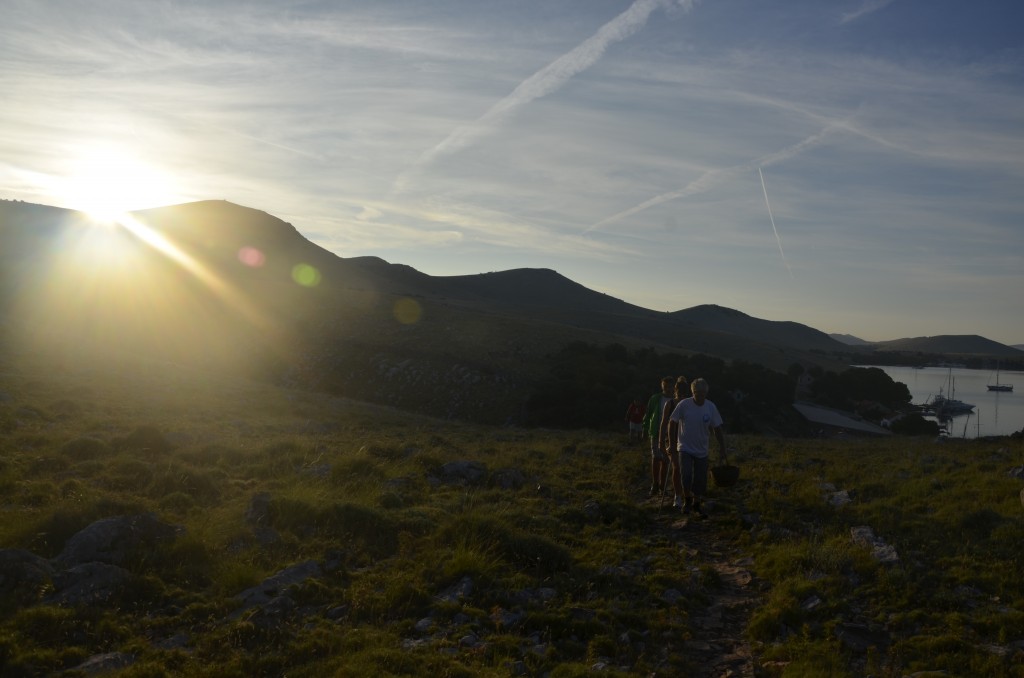 By two o’clock it was very hot. The tents were set, food was stowed and the big pot of fažole (beans) was finished. We told the students that they would have free time for the rest of the afternoon until the evening, when we would be setting the nets to catch fish. For the afternoon they should relax and rest up, since we would be getting up at 4 am.
By two o’clock it was very hot. The tents were set, food was stowed and the big pot of fažole (beans) was finished. We told the students that they would have free time for the rest of the afternoon until the evening, when we would be setting the nets to catch fish. For the afternoon they should relax and rest up, since we would be getting up at 4 am.
I wish I had the camera out to catch the look on their faces. It was classic…silence, a glance at their friend to see if I was serious, then a glance at the educators from the home, then they realized it was true. Nobody smiled, I told them the reason.
“We are here to work in the field, and as the weather in the summer is so hot, we have to work before the sun comes up, when it is cool, and we will be done before breakfast. We will climb the mountain in the dark with flashlights and then work through dawn collecting sage. When we get home we can rest and eat and swim whatever you want all day…Fijaka.” Fijaka is a word that is famous in the islands and most simply means the “art of doing nothing.”
They looked at each other and the first smile broke. Your crazy they said. “I know,” I replied, “but this is how people, your ancestors, have been working in the islands for centuries. Next week you will return to the mainland with a new found appreciation for the lives of those people, your people.”
The rest of the day went great. Swimming and playing in the crystal clear water. At around 6 o’clock Lovro asked who would like to go set the nets to catch fish. Several students jumped at the chance. The students were settling into the pace of life here.
Since the sun was now, low it was cooler and we were able to work on another project we had planned. I had been working to replace the mast on the Skračić family gajeta. Two years earlier the boat had been dismasted and this was the perfect opportunity to get a new mast on the boat.
Lovro and I had worked at a feverish pace before the trip to get things together, Starting with a dry spruce log we made the mast in two days, behind my house. Now we just had the finishing touches to complete. Students helped with the final sanding, painting, and rigging. By sunset the new mast was ready to be put into the Kaić.
After finishing evening chores, the complaining started. “What are we going to do now?” There was no signal on their cell phone and this started to annoy them. I told them if they were bored, they could go to the store and buy some cookies and soda.
They got very excited…”A store”…”Where”…
”Over the hill there,” I replied. They started to get ready.
“How do we get there,” they asked.
“You have to ask Zvonko, he knows the way”
It wasn’t till they were ready to go, and they got directions from Zvonko that did they realize that we were kidding. Everybody laughed and from then on the students used ‘going to the store’ as a metaphor for getting away from the adults.
Complaining has a special tone when it comes from a teen-ager. You know that no matter what happens, the outcome will be the same, and attitude is everything. They seem almost helpless. I can’t do this. I wont do this. In these situation the only thing to do is have them decide on the consequences of non-participation.
“At 4 am if you don’t get up what will happen.” I asked the group. They worked it out that they would dump water on the offending sleeper. There was much debate as to how much and when, at how many attempts. So much so that that at 4 am when the wake up went out, no one got the medium sized cup of water on the face 15 minutes after the call was made.
Involving them in the process was key to wake up. The group was split about 50/50 to morning people and ones who wished they were still in bed. After a short breakfast, we switched on the flashlights and made our way through the quiet village toward the mountain. Early shades of dawn were already on the horizon and the hills behind the village had an angelic glow like an aura around them. By the time we made it to the site for picking sage we didn’t even need the lights any more.
The ground was rocky and uneven. Spiny shards of limestone stuck up through the ground between the sage bushes. We instructed the students how to cut the sage without damaging the plant, and they went to work in teams of two. We were helping Lovro’s family business called Salvia – http://en.kadulja.com, the with the collection of these herbs to make hydrolat, a distillation of sage, essential oils and teas. The sage from Kornati is particularly sweet smelling and is great for making aromatic products.
As the students worked in teams of two cutting the sage, the sun gradually made its entrance. To see a sun rise in Kornati is a special event. As the radiance comes from behind the hill it puts its light on the peaks and islands across the archipelago. Like a tap from a magic wand bringing each one to life, the land is awakened in color of blue, beige, and green on the land and sea, and reds, violet and midnight blue disappearing and shimmering across the clouds in the sky.
We worked our way to the top of the nearby peak. Each team had a full bag. It was not easy work, and students were not necessarily happy about doing it, but now that it was over, we were on the top of a peak watching the splendor of the morning sun, we all felt a certain sense of accomplishment and wonder as the night turned to day. Below the village was starting to wake up. From our vantage point, we could see the people walking around and fishermen getting ready to go collect the nets.
Lovro told the students he would be going out fishing and again there were several students who wanted to go. It seemed that fishing was more fun than cutting sage. We slowly worked our way down the treacherous terrain toward the village.
They fished on the far side of the islands, close to the island of Mana with its steep cliffs and overhangs. Only residents of the islands have a right to fish in these islands since it is a national park and fishing with Lovro was a special thing too, since he knew all the best spots. They caught several fish. When Lovro and the students came home, they decided they would make lunch with the fish that they had caught. It was about 9 am.
In America there used to be a slogan for the U.S. Army- we do more be for 9 am than most people do all day. This was definitely true for these kids. They climbed a mountain, harvested herbs, and now they hade a big haul of fish they would have for lunch. But in the army they keep working, for us the rest of the day would be following local custom of fiaka, sleeping under the pine, playing cards, swimming or just gazing out over the islands reflecting on the mornings accomplishments, waiting for the sun to go back down.
The brudet, fish stew, was done around noon; a mix of potatoes, onions, the freshest fish and a nice tomato base. I don’t think the students had been used to eating fish this way. When I asked one of the students how it was he responded, “Disgusting,”
I was shocked. “How can you say that? You all worked together to make this. It is your brudet. We caught the fish and prepared the sauce and made the food.” This was a bit of a realization for them, a turning point. They were all quiet. It was not my trip, it was our trip, and the work that we do we do together. It may be disgusting but it was our disgusting. Here there was no restaurant. No cook for us to return the food to, it was a slice of life that we would remember forever and attitude is an essential part of that.
That evening we prepared the boats and they whole gang loaded Kurnatarica and the newly rigged gajeta to go sailing to set the nets. Sailing with the two boats was great. Passing by each other we practiced tacking and sailed with the lantina back and forth across the bays of the islands.
We sailed to the island of Balon and set nets for the next day. There was a spot we set anchor and went ashore. Students were now in island mode. Without being told, a few went to the top of the island to have a look around and others climbed the western side to look at the steep cliffs over the sea. The mood was high, the students felt and looked great, rejuvenated from a restful day, and as we smiled and joked about the morning. It was obvious that the pace of life had settled in. We had made it through our first full revolution of work, fishing, rest, lunch, rest, work, fishing.
The plan for the next day was to go with Slobodan to harvest Blackberries and figs. We would even sleep in a bit. I told the students they would get up at six. They all smiled and seemed relived. “After a 4 am wake up anything later than that is an improvement” they said.
With the wakeup rules still in place, students had no problem making it out of bed. Before long we were up on the hills picking berries and figs. Slobodan had brought several baskets and we worked our way across the hill filling them and our mouths with the sweet black berries. We finished picking when we arrived at the small chapel Gospe od traca, which is in the next bay over from Kravljačića.
There were still some lingering complaints in the group. I taught them a little game “the secret of sarcasm.” I said ” I will lift the ban on complaints, and anyone can say anything, but your must use a sarcastic tone, that way everyone will laugh.” For example, “I love picking berries,” I said with as much enthusiasm and eye rolling as I could. The sarcastic approach worked for the rest of the day they were making jokes about how they loved getting up at 4 am and loved walking across mountaintops. The smiles were abundant.
Lovro had brought the boat over from the village, loaded the full baskets, and took some of the students to collect the nets. We had harvested about seven kilos of berries. Amazing! This was definitely a record at least for us. We had plenty to give all Lovro’s relatives enough to make a big pot of jam each. Large bowls of berries were distributed around the village. One of the students was in cooking school and said he knew how to make a blackberry syrup for pancakes. It was fantastic! Again we hade made food from our own hard work. This time the sense of accomplishment was evident, and sweet syrup is always better than salty fish for any teen ager.
After a nice relaxing day, we got ready for the closing activity; a climb to the top of Kornati. Again, these things that we did were not easy. Climbing a mountain is never as hard as you think it will be, but looking up at the hill looming behind the village, the task looked daunting. Ironically one of the students who had the hardest time on the first morning, was now a motivator helping others find the spirit to make it to the top.
When we finally made it, looking out over the islands, the students were speechless. The speckled islands illuminated by the evening sun were amazing. We had a closing activity where the students sat quietly and wrote letters to themselves. This is an interesting activity as they contemplate what they learned and what they may need to know in a few months.
We had turned a corner; there was a quiet contemplative silence that permeated the landscape. It was inspiring. How these students had come to this point learning not only about the history of the islands, the culture of their ancestors, but also about themselves, who they are, and who they can be. This journey was one that allowed them to experience the world in a very real and tangible light.
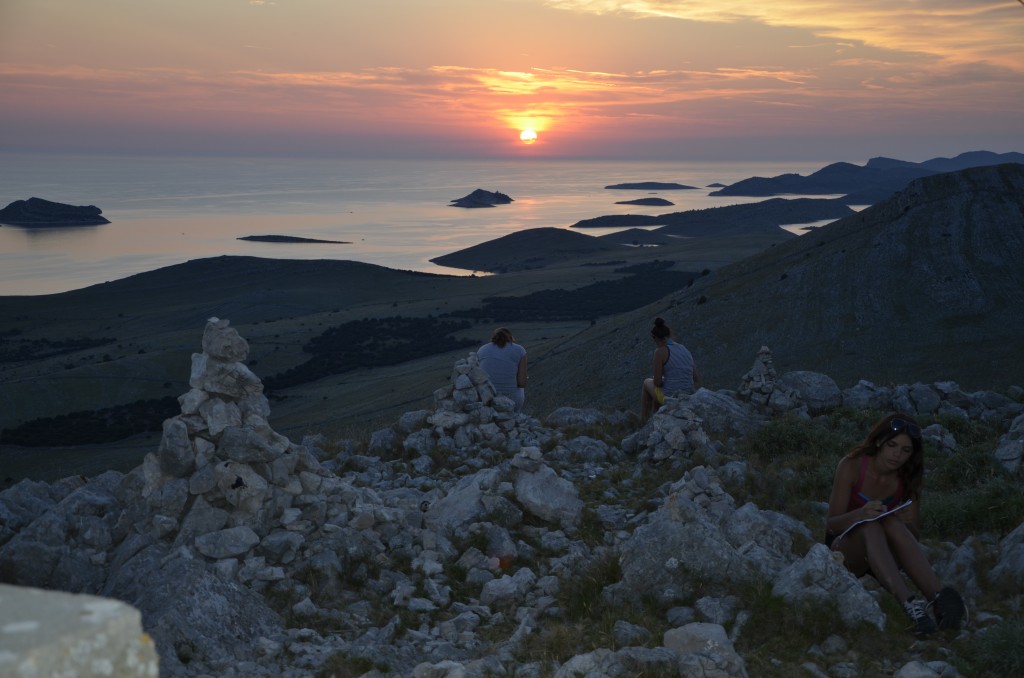
When we were ready to go, the students asked if they could stay a little longer, not because they didn’t want to walk, or were tired as they had done the day before, but so they could enjoy the place, the view, the feeling for a few more minutes. Of course, it would mean hiking in the dark, but the students were used to that by now. As the sunset, lights came on in the far away islands and towns. When we made it back to the village Zvonko, Lovro’s father was playing guitar and the student gathered around. What a perfect finish to a perfect day in Kornati.
The last morning wake up time was 6:30. We struck camp and got ready to go. The garbage from the camp had to be brought across to the other side of the bay to the dumpster. One of the students Kate, who had been on the Watermelon Voyage and recently studied to get her Captain’s license asked if she could take the Kaić to bring the garbage. Zvonko said she could, but only with the oars.
As Kravljačica is oriented to the bay, all the residents got a front row seat to watch Kate be in command of her first vessel. Two other students went with her. Rowing a gajeta is not easy, and everyone in the village watched as they approached the landing. It was suspenseful. The turn, the footing, would they make it? A few slight maneuvers and they made it, garbage unloaded. Then when one of the crew was almost marooned by the dumpsters, you could hear laughter around the village, A few sharp snaps from Kate and the boat was back, he was on board and they slowly and carefully picked their way across the anchorage and made it back to the dock in front of the Skračić family house. The whole village applauded.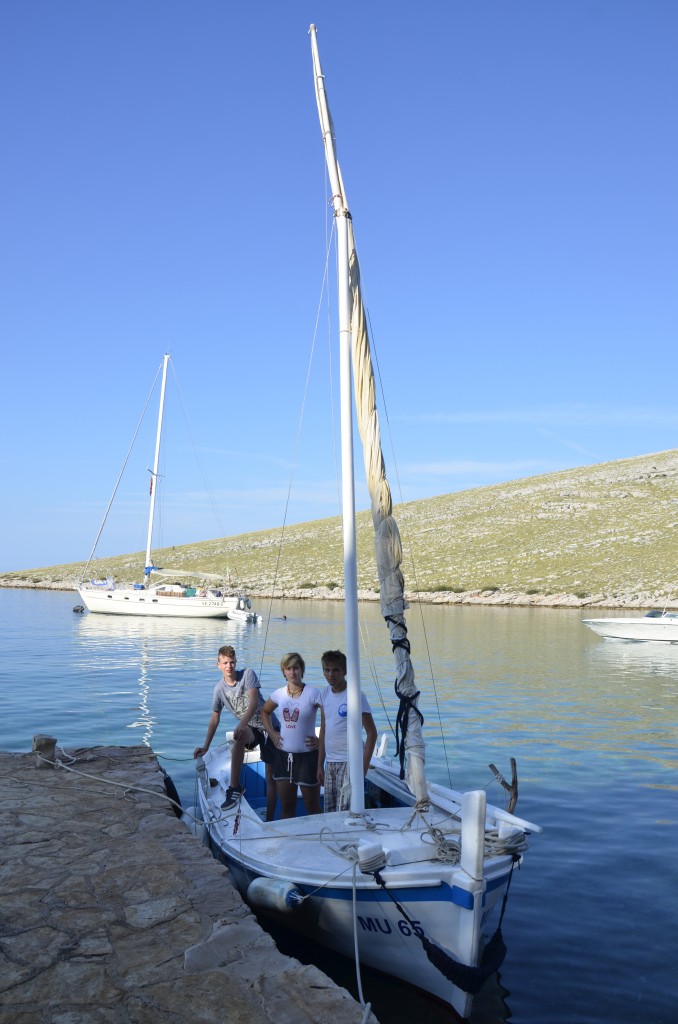
As Kurnitarica and Slobodan’s leut were loaded, we untied the dock lines and the students sang a song the they had learned while in the village. “Kurnatari, Kurnatari, mismo ni bolje mornari. –(people from Kornati, we are the best sailors) The echoes of their voices filtered down the narrow bay. As we left Kravljačica the steady hum of the leut’s motor blurred the memories of the past few days. One thing was for certain, the students and the residents of Kravljačica would have some great stories to tell.
